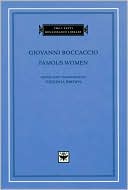

 |

|

The average rating for Famous Women (I Tatti Renaissance Library) based on 2 reviews is 2 stars.
Review # 1 was written on 2019-01-06 00:00:00 Jim Schesvold Jim SchesvoldTo begin, I got a headache reading this which I believe sums up my experience with this book perfectly. It's just, not a fun read. I winced at the sexism that just saturated the book, and I know that it's to be expected from the time it was written, but I just couldn't believe the things Boccaccio said. Honestly, to be famous in his eyes you must either be a virgin, devoted to god, "manly" so you can rise above the "inferior" sex (at which I cringed so hard) or give in to the "womanly" sins of lust and greed. Needless to say, I did not like this book at all, but I did learn some new names that I may like to research from other, not sexist, sources, like Circe and Arsïnoe. I wouldn't recommend this to anyone, but it felt great to finish it after the great torture I put myself through in reading it! |
Review # 2 was written on 2015-11-11 00:00:00 Scott Glovier Scott GlovierThis book is marvelous fun. Look at the terrible things Circe (the temptress) made her captives do: "With her wiles and charming words not only did she entice many who reached her shore to join in her wantonness: some she pushed into robbery and piracy; others she induced with her tricks to cast all honor aside and take up commerce and trading; many she made arrogant because they loved her inordinately." (p. 75) GASP! She turned respectable men into merchants?? Oh the horror! ------------------------------------------------ So I've read parts of this book: although I think readers looking for Decameron-esque stories will be disappointed, Famous Women is still interesting in its own right. Essentially, it's an encyclopedia of famous (and infamous) women: the audience is meant to draw a moral lesson from their example. However, the modern reader will be further entertained by the amusing attitudes and anachronisms, as I hope my quote demonstrates. To broaden his scope, Boccaccio included ancient goddesses along with contemporary women. His inclusion of purely legendary material allows him to trace the invention of writing, painting, and agriculture to a single woman. He follows the theory of 'euhemerism,' writing that mythical figures were once real individuals so revered in their lifetime, they later became worshiped as gods: "Since all these people were blinded by the blackest ignorance, they declared this woman to be an immortal goddess, although they knew she had been born of a mortal woman." (p. 19-20) Famous Women is also amusing for its blatant inconsistencies. Boccaccio tends to extract whatever moral lesson is convenient, regardless whether it clashes with earlier conclusions. In one story (p.92) he writes how a Vestal Virgin gave birth to Romulus and Remus, for which she was put to death; this gives him an opportunity to criticize families who force their daughters into covenants. But in a different story (p.82) (where he recalls Queen Dido's alleged suicide to protect her virginity), he criticizes women who do not remain chaste. Overall, it's an entertaining kaleidoscope of legend and chronicle, of moralizing and classicizing sensibility. This book was widely read in its time; a French translation, Des Cleres Et Nobles Femmes, was Christine de Pizan's primary source for The City of Ladies. And don't forget the many beautiful illuminations made of this book: The Goddess Isis, also called Io, sailing towards Egypt |
CAN'T FIND WHAT YOU'RE LOOKING FOR? CLICK HERE!!!